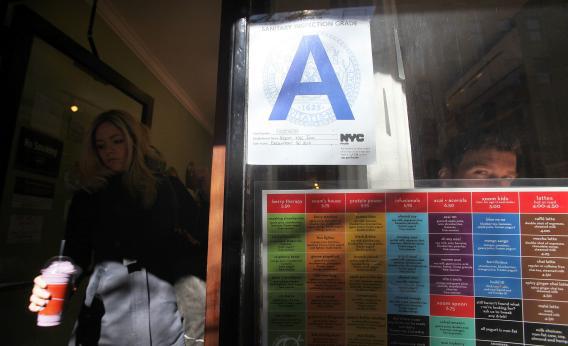If you knew that your favorite local eatery failed its latest health inspection, would you still eat there?
Most of us don’t have to consider that question because restaurant hygiene scores are hard to find—we would have to go out of our way to locate the information on lousy government sites. But that may be about to change. Yelp announced Thursday that health scores will now appear on the site’s listings for San Francisco and New York City restaurants.
But the important thing here isn’t that you can now go to one place to find a restaurant that’s delicious, has decent parking, and sanitary. The real news is the new open data standard, Local Inspector Value-entry Specification (LIVES), that makes this integration possible. The service transforms open government data into meaningful pieces of information that can be delivered to the website or app where health inspection reports are most likely to be useful. By simply presenting sanitation scores to their users, Yelp widens the reach of government data for the public.
This type of public-private collaboration continues is not without precedent. As I described in Future Tense last September, in 2005 Google and TriMet, Portland’s transit agency, partnered up to create in the General Transit Feed Specification, which allowed for bus and train information to be integrated into Google’s Trip Planner—and was soon replicated around the country. But these sorts of common-sense collaborations have been hobbled by insufficient data standards. Yelp’s announcement marks the first significant partnership since Google’s, highlighting the important role that private companies must play in creating data standards for public good.
Luther Lowe, Yelp’s director of public policy, told me Thursday that “Yelp is excited the city of San Francisco and New York helped co-develop a standard that will invite new cities to participate in the open sharing of hygiene scores.” Indeed, scores for Philadelphia, Boston, and Chicago eateries will be available soon. By making restaurant scores available through LIVES, food and safety standards could be evaluated across cities. This would not only allow diners to make more informed decisions about the next bite they grab; it would also help policymakers make more informed decisions about developing food safety and public health policies.
Within 18 months of requiring restaurants to publicly post their sanitary gradings, according to a report issued by the City of New York’s Health Department, the number of restaurants receiving an A grade upon first inspection increased to 41 percent from 27 percent. While there are a number of factors involved in potential ratings increases across New York City, if in fact sanitary grades improve shortly after becoming more easily available, then Yelp’s new feature could also lead to improved restaurant hygiene in our cities. So, tip of the hat to Yelp for providing meaningful information to diners, maybe even indirectly cleaning up our restaurants and making food safer to consume—and kudos, too, for potentially paving the way for more private-public data partnerships.
